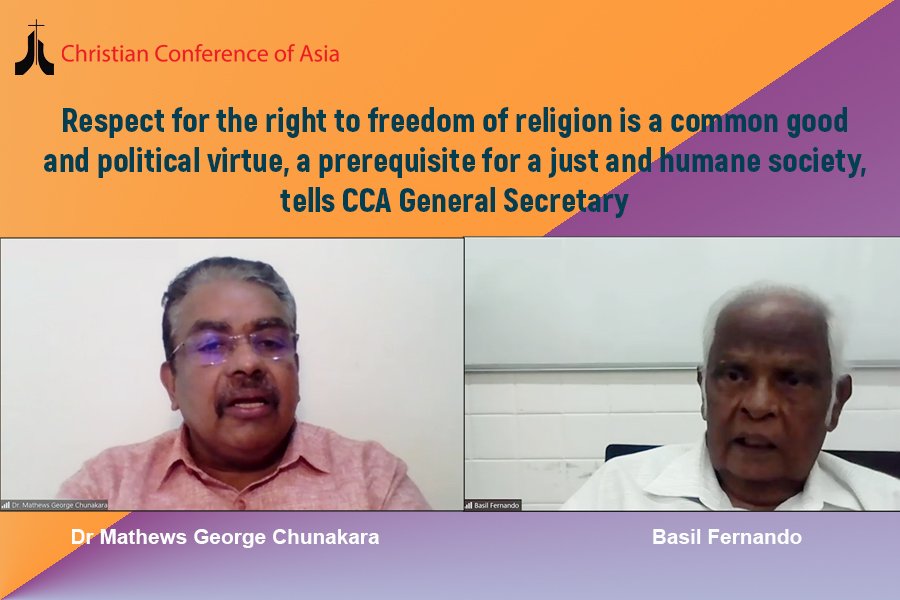Respect for the right to freedom of religion is a common good and political virtue, a prerequisite for a just and humane society, tells CCA General Secretary

“The respect for the right to freedom of religion is a common good and political virtue, and it is a fundamental prerequisite for a just, peaceful and humane society. The right to freedom of religion or belief is often violated by both governments as well as individuals, acting either on their own behalf or as members of majority groups. Widespread and grievous violations of this freedom affect the stability, security and adversely impact the daily lives of individuals, families, and communities, especially their peaceful coexistence and the overall wellbeing of society’, stated Dr Mathews George Chunakara in the thematic address at the opening session of the Asia regional consultation organized by the Christian Conference of Asia (CCA) on 'Freedom of Religion, Rights of Religious Minorities, and Constitutional Guarantees in Asia’.
Forty-five participants are attending the four-day Consultation being held from 5 to 8 October 2021.
“Although the international community has been taking significant initiatives to protect the freedom of religion, religious minorities in several countries are becoming targets of discrimination; the religious minorities in several countries in Asia face acts of violence or hostility and even persecutions, merely because of their faith being different from that of the majority religions as well as owing to their adherence to a certain religion," added Dr Mathews George Chunakara.
Dr Chunakara outlined a detailed history of the evolution of the legal processes leading to the drafting of the right to freedom of religion and belief (FoRB), international declarations, conventions, and accords, and an overview of the constitutional guarantees of FoRB as currently prevalent in different Asian countries.
He also explained the substantial contributions of the ecumenical community to the discourse around the drafting of Article 18 of the Universal Declaration of Human Rights deals with freedom of religion.
Quoting examples from several Asian contexts, the CCA General Secretary observed that the governments in those Asian countries are not in a position to protect the rights of the religious minorities whenever they face violence and lack of legal protection by the State.
“In such situations, the question that remains to be addressed is: to what extent can freedom of religion or belief be considered an absolute right in pluralistic societies?” asked the CCA General Secretary.
Basil Fernando of the Asian Human Rights Commission in the second session on ‘The Politicisation of Religion and the Religionisation of Politics,’ stated that religion was manipulated to legitimize those in power and analysed the different types of repression that prevailed in different Asian countries.
“Religious fundamentalism acts as a camouflage for other deeper sociopolitical realities. In actual fact, there are no religious conflicts but rather conflicts in the name of religion, such as struggles for power, control, or ownership of resources. Ideology must be distinguished from religion as a limited political end, manufactured to support narrow ideas or to claim certain things,” stated Basil Fernando.
Mr Fernando, known as a bulwark of human rights defence in Asia, shared examples of how religion was manipulated to legitimize those in power and analysed the different types of repression that prevailed in different Asian countries.
“The concept of cooperation is at the heart of various influences and forces, and religion, among these, is what has contributed most idealistically and comprehensively to humanity,” said Mr Fernando, and he called upon the participants to re-assert their Christian identity as being rooted in ‘the love of the other, the love of the neighbour’.
Lively discussions from the participants on the use of digital spaces and social media for advocacy against religious extremism, as well as the role of religious leaders at the grassroots, ensued during an open session for sharing.
The second day of the Consultation, 6 October 2021, will feature a key session on ‘Minority Rights: Understanding Asia’s Majority-Minority Contexts’ by Dr Fernand de Varennes, UN Special Rapporteur on Minority Issues, and an interfaith panel discussion by representatives of four major religions on ‘Combating Resurgence of Religious Extremism in Asia: Role of Religions’.











